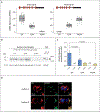A Protein-Truncating HSD17B13 Variant and Protection from Chronic Liver Disease
- PMID: 29562163
- PMCID: PMC6668033
- DOI: 10.1056/NEJMoa1712191
A Protein-Truncating HSD17B13 Variant and Protection from Chronic Liver Disease
Abstract
Background: Elucidation of the genetic factors underlying chronic liver disease may reveal new therapeutic targets.
Methods: We used exome sequence data and electronic health records from 46,544 participants in the DiscovEHR human genetics study to identify genetic variants associated with serum levels of alanine aminotransferase (ALT) and aspartate aminotransferase (AST). Variants that were replicated in three additional cohorts (12,527 persons) were evaluated for association with clinical diagnoses of chronic liver disease in DiscovEHR study participants and two independent cohorts (total of 37,173 persons) and with histopathological severity of liver disease in 2391 human liver samples.
Results: A splice variant (rs72613567:TA) in HSD17B13, encoding the hepatic lipid droplet protein hydroxysteroid 17-beta dehydrogenase 13, was associated with reduced levels of ALT (P=4.2×10-12) and AST (P=6.2×10-10). Among DiscovEHR study participants, this variant was associated with a reduced risk of alcoholic liver disease (by 42% [95% confidence interval {CI}, 20 to 58] among heterozygotes and by 53% [95% CI, 3 to 77] among homozygotes), nonalcoholic liver disease (by 17% [95% CI, 8 to 25] among heterozygotes and by 30% [95% CI, 13 to 43] among homozygotes), alcoholic cirrhosis (by 42% [95% CI, 14 to 61] among heterozygotes and by 73% [95% CI, 15 to 91] among homozygotes), and nonalcoholic cirrhosis (by 26% [95% CI, 7 to 40] among heterozygotes and by 49% [95% CI, 15 to 69] among homozygotes). Associations were confirmed in two independent cohorts. The rs72613567:TA variant was associated with a reduced risk of nonalcoholic steatohepatitis, but not steatosis, in human liver samples. The rs72613567:TA variant mitigated liver injury associated with the risk-increasing PNPLA3 p.I148M allele and resulted in an unstable and truncated protein with reduced enzymatic activity.
Conclusions: A loss-of-function variant in HSD17B13 was associated with a reduced risk of chronic liver disease and of progression from steatosis to steatohepatitis. (Funded by Regeneron Pharmaceuticals and others.).
Figures





Comment in
-
An HSD17B13 variant reduces cirrhosis risk.Nat Rev Gastroenterol Hepatol. 2018 Jun;15(6):328. doi: 10.1038/s41575-018-0016-7. Nat Rev Gastroenterol Hepatol. 2018. PMID: 29686405 No abstract available.
-
Genetics Meets Therapy? Exome-wide Association Study Reveals a Loss-of-Function Variant in 17-Beta-Hydroxysteroid Dehydrogenase 13 That Protects Patients From Liver Damage and Nonalcoholic Fatty Liver Disease Progression.Hepatology. 2019 Feb;69(2):907-910. doi: 10.1002/hep.30209. Epub 2018 Dec 28. Hepatology. 2019. PMID: 30102780 No abstract available.
References
-
- Kochanek KD, Murphy SL, Xu J, Tejada-Vera B. Deaths: final data for 2014. Natl Vital Stat Rep 2016;65:1–122. - PubMed
-
- Browning JD, Szczepaniak LS, Dobbins R, et al. Prevalence of hepatic steatosis in an urban population in the United States: impact of ethnicity. Hepatology 2004;40:1387–95. - PubMed
-
- Williams CD, Stengel J, Asike MI, et al. Prevalence of nonalcoholic fatty liver disease and nonalcoholic steatohepatitis among a largely middle-aged population utilizing ultrasound and liver biopsy: a prospective study. Gastroenterology 2011;140:124–31. - PubMed
-
- Younossi ZM, Stepanova M, Afendy M, et al. Changes in the prevalence of the most common causes of chronic liver diseases in the United States from 1988 to 2008. Clin Gastroenterol Hepatol 2011;9(6): 524–530.e1. - PubMed
Publication types
MeSH terms
Substances
Grants and funding
LinkOut - more resources
Full Text Sources
Other Literature Sources
Medical
Molecular Biology Databases
